By Lauren Gilbert
Director of Public Services, Center for Jewish History
“A Very Ticklish Problem”: The AJC Response to the Rosenberg Trial & Execution
Convicted of passing atomic secrets to the Soviet Union, Julius and Ethel Rosenberg were executed 70 years ago on June 19, 1953, the first and only American civilians to face the death penalty for espionage. At the time, many believed the Rosenbergs to be innocent victims of antisemitism and Cold War hysteria, or at the very least that they had received an overly harsh sentence. Prominent defenders included Albert Einstein, Pablo Picasso, Pope Pius XII, W.E.B. DuBois, Linus Pauling, Jean-Paul Sartre, and Nobel Prize-winning chemist Harold Urey.
The American Jewish Committee (AJC) Collection at YIVO contains several files about the Rosenbergs and their trial. The AJC was founded in New York in 1906 to defend the civil and religious rights of Jews and other minorities throughout the world. Given the illustrious history of the organization and their strong stance against discrimination, one might expect the AJC files to contain materials about their defense of the Rosenbergs, or at a minimum, their denunciation of the antisemitism surrounding the affair or the severity of the punishment. But the archives tell a different story.
The cover letter for a memorandum called “The Defense of Ethel and Julius Rosenberg: A Communist Attempt to Inject the Jewish Issue,” dated March 27, 1952, warns, “In recent months Communists have been attempting to agitate concerning these condemned persons and to inject into the situation a suggestion that there are anti-Semitic implications to the conviction and the sentences. The AJC believes there is no foundation for such charges.” [see below]
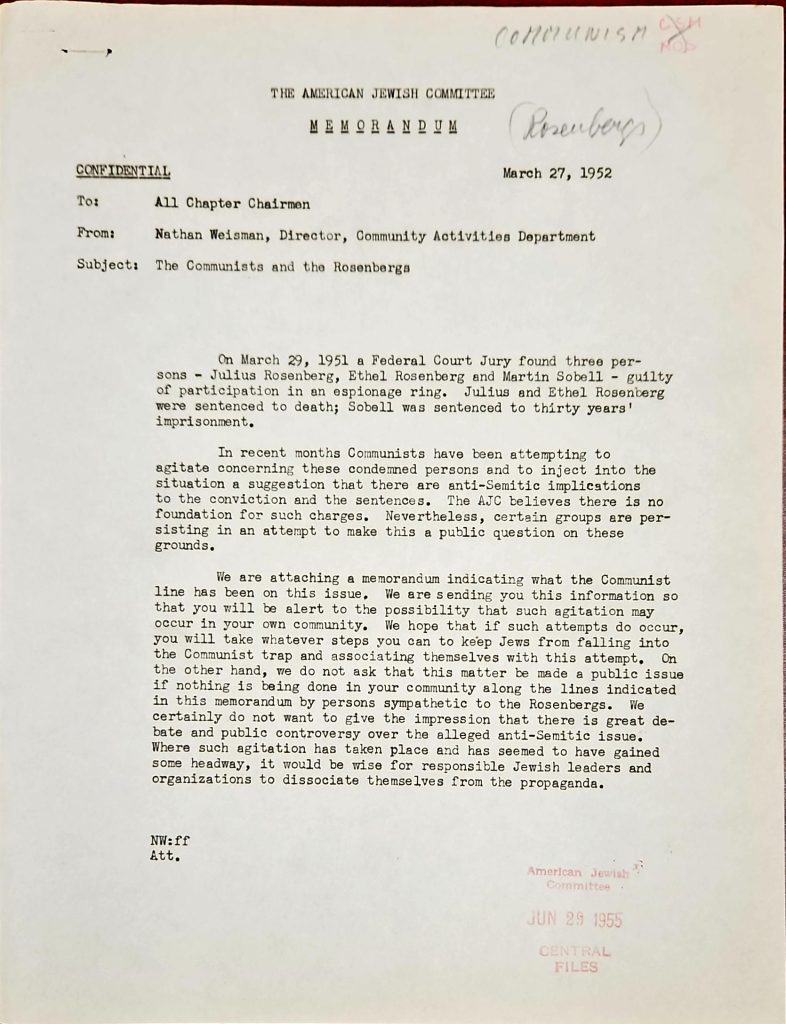
The AJC circulated another article defending the proceedings in June of 1952, entitled “The Communists Find a New Opening,” in which they denied any evidence of antisemitism, concluding: “Once more we find Communists and fellow-travellers trying to make anti-Semitism and anti-communism appear synonymous…The net that is being woven from spurious threads of the Rosenberg case must be regarded as one more example of Communist trickery.” They sent this report gratis to 1800 rabbis and Jewish periodicals and offered 10 additional free copies to anyone who requested them, stipulating however that they be kept “within Jewish circles,” so as not “to help the Committee for the Rosenbergs to obtain the attention of the general public.” [see below]
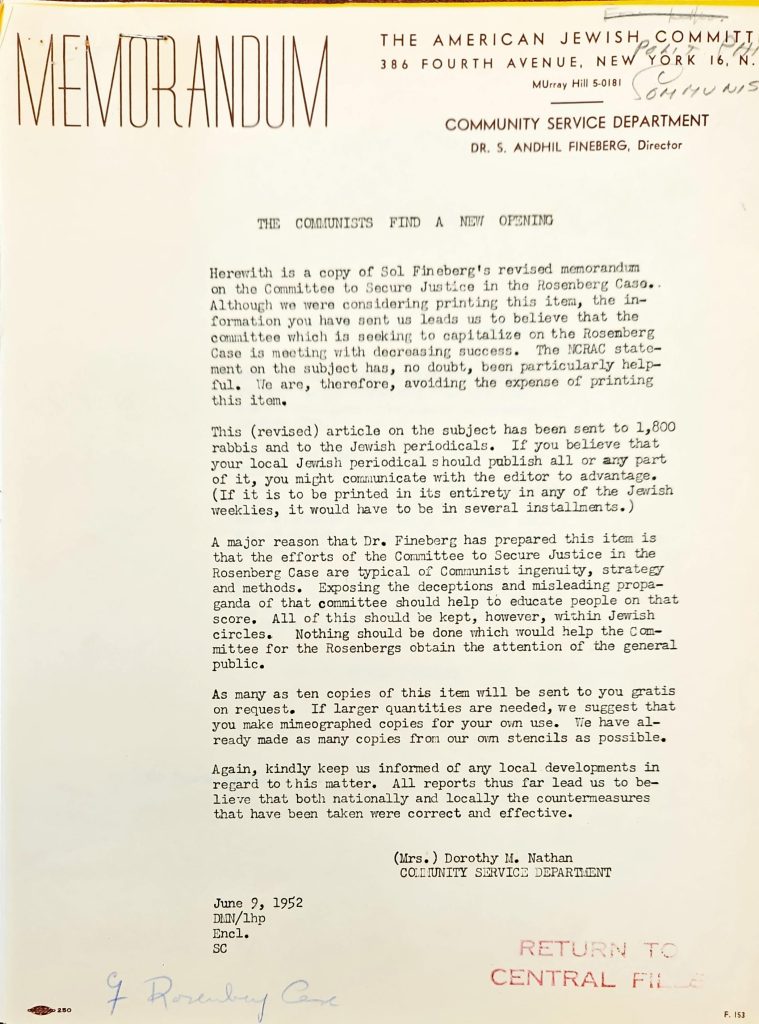
When Rabbi Abraham Cronbach wrote to the AJC in November of 1952, asking whether they might intercede with the President for “the commutation of this dreadful sentence,” AJC director S. Andhil Fineberg responded: “I believe that the evil consequences of what you are doing by serving as a tool of the Committee to Secure Justice in the Rosenberg Case are infinitely greater than any good you might accomplish…I believe that the Committee to Secure Justice in the Rosenberg case is an instrument of the Communist Party rather than a means for saving their lives.” [below]
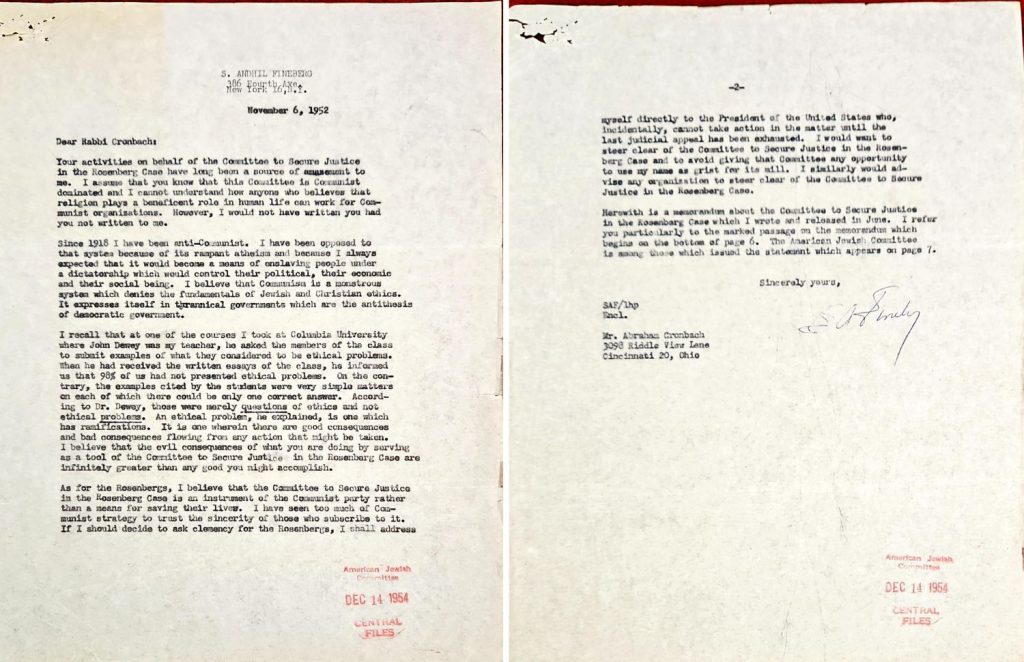
Over and over again, in their efforts to appear anti-communist and above reproach, the AJC asserted that the treatment of the Rosenbergs was completely fair. They strove to make it clear which side they (and all good patriotic Americans) were on.
Perhaps this is not surprising in a political climate of fear and paranoia, when anyone suspected of harboring Communist sympathies or holding radical political views was subject to investigation, often leading to arrest or imprisonment. Mere suspicion could result in the loss of current or future employment. The Rosenberg case only heightened mistrust against a Jewish community already under a cloud in American society, as members of a demographic associated with radicalism and socialism.
Obsessively monitoring public opinion regarding Jews and Communism, as early as 1950 the AJC commissioned a survey about the “Impact of Atom-Spy Publicity,” for which they interviewed people on the streets of New York City, Washington, D.C., and Detroit, inquiring: “What do you think of the atom bomb spy stories appearing in the newspapers?” Though some responses were non-committal or generically anti-Communist, many were blatantly antisemitic: [below]
“Jews should not be permitted to work in atom laboratories.”
“Every Jew is a Communist. Just go to Union Square and you will see that everyone has a hooked nose. Hitler didn’t finish the job.”
“Don’t kid me, you know as well as I do who’s helping the Reds. It’s those god damn Jews.”
“Do you read the papers? What are their names? It isn’t Giuseppe, Kelly, or O’Flaherty! Shoot the bastards!”
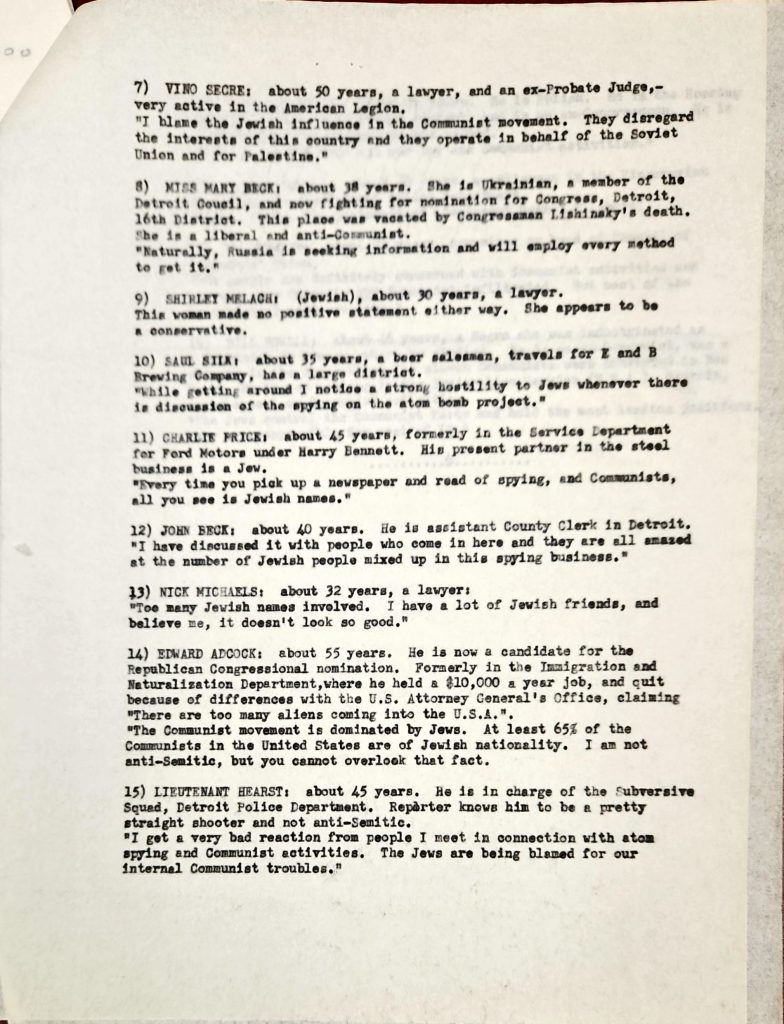
A memorandum from February 28, 1952, warning Jewish organizations not to let their buildings be used for meetings in support of the Rosenbergs, clearly spells out the roots of this anxiety among the Jewish community: “We have a directive to dissociate Jews and Communism in the American mind…Jewish organizations should be warned that the FBI has been making careful note of pro-Communist meetings and that these pro-Rosenberg meetings will surely go into the record…The Jewish community owes nothing to the Rosenbergs and must not be put into a position wherein the general public assumes that the Jewish community is on the side of the Rosenbergs…”
In a letter dated December 23, 1952, Fineberg acknowledges, “We are in a tough situation, skillfully concocted by the Communists. If they were not conducting an international campaign of slander against the United States, the survival of the Rosenbergs by granting clemency would be a different matter than it now is…It is a very ticklish problem wherein we can and should make it clear that there is no ‘Jewish Interests’ and no civil liberties issues involved.” [below]
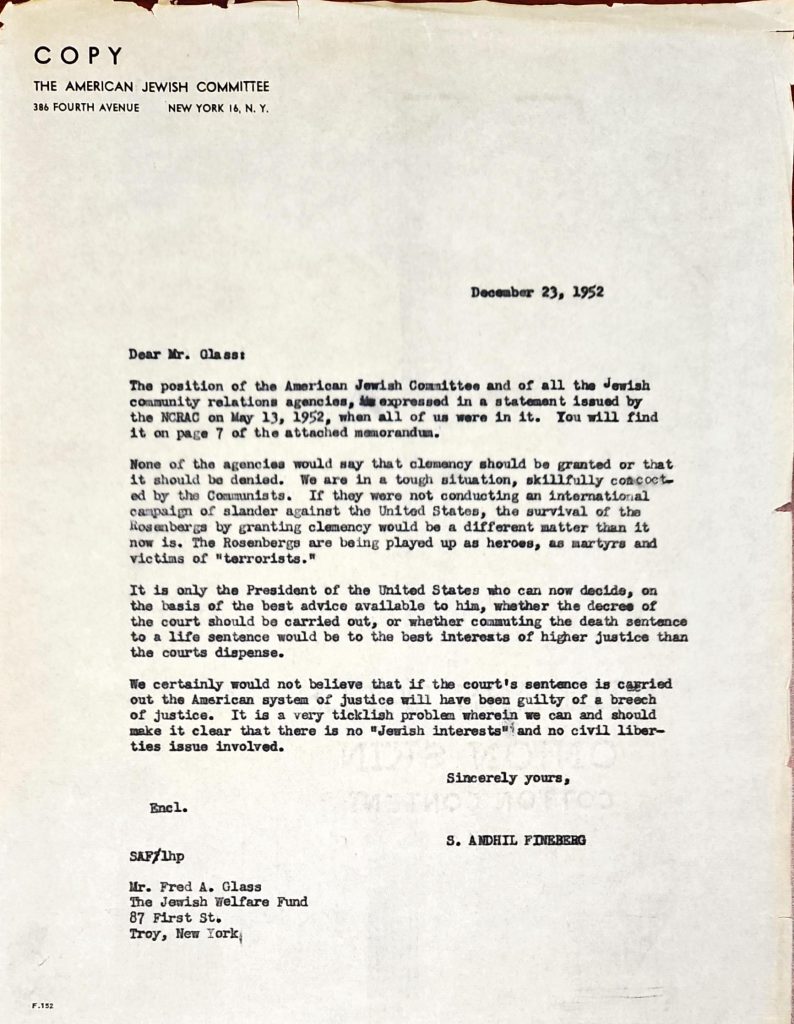
In this environment, all of the mainstream Jewish organizations, including the Anti-Defamation League of B’nei B’rith, the American Jewish Congress, the Jewish War Veterans of the United States, and the Union of American Hebrew Congregations, banded together with the American Jewish Committee to issue a statement condemning the efforts by the National Committee to Secure Justice in the Rosenberg Case to “inject the false issue of anti-Semitism.” [below] The AJC files at YIVO contain pages of correspondence with these other groups, sharing their various memoranda and reports asserting that justice was served in the Rosenberg trial, and strategizing about how to distance themselves from the Rosenberg defenders. In a 1956 letter, Fineberg exults, “I am extremely glad that we managed to keep all prominent Jews out of this Communist trickery except Rabbi Cronbach and Albert Einstein.”
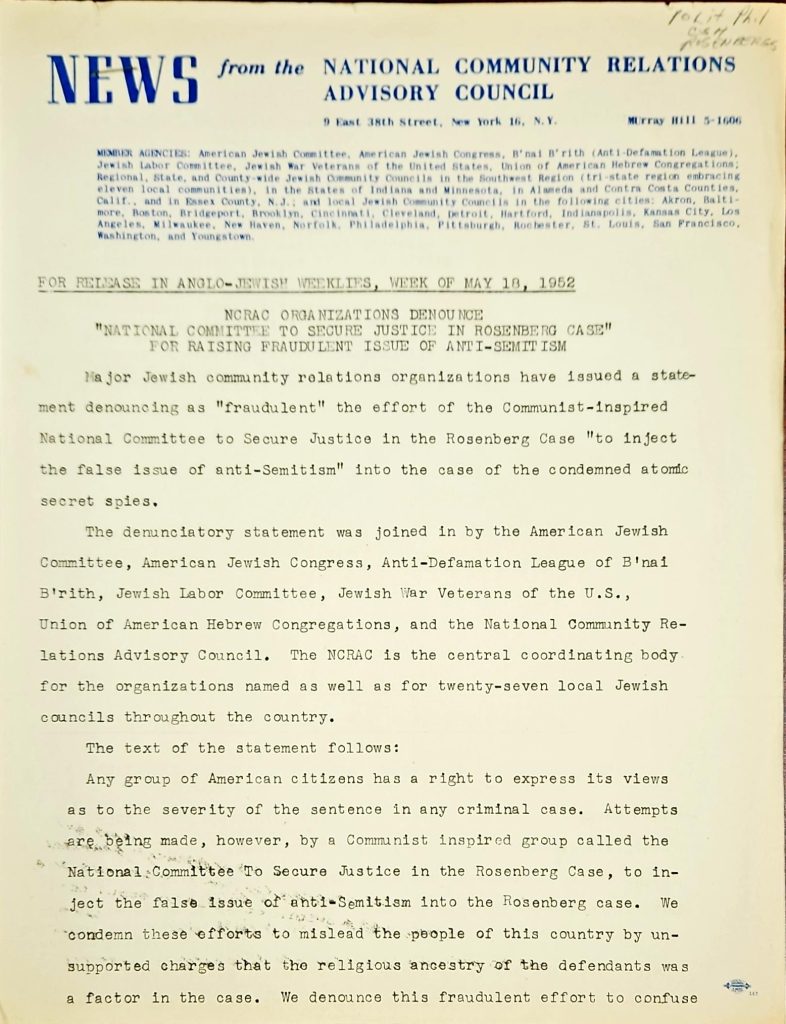
Taking a page from a Cold War spy novel, AJC officers infiltrated meetings of the Committee to Secure Justice in the Rosenberg Case in Los Angeles, New York [below], and Minneapolis and wrote up detailed findings to share with AJC headquarters. The summary of the Los Angeles event warns that the “Committee is liable to drag huge numbers of unsuspecting non-communists into their sphere…” Later in the report, in a section with the heading “A Pick-Up,” the writer describes flirting with a “very good-looking young woman, whose eyes had hung with near ecstasy on every speaker’s lips.” He suggests a cup of coffee at Langer’s Delicatessen, where he engages her in conversation by pretending to be dissatisfied with the “American way of life,” securing an invitation to her home as well as future meetings.
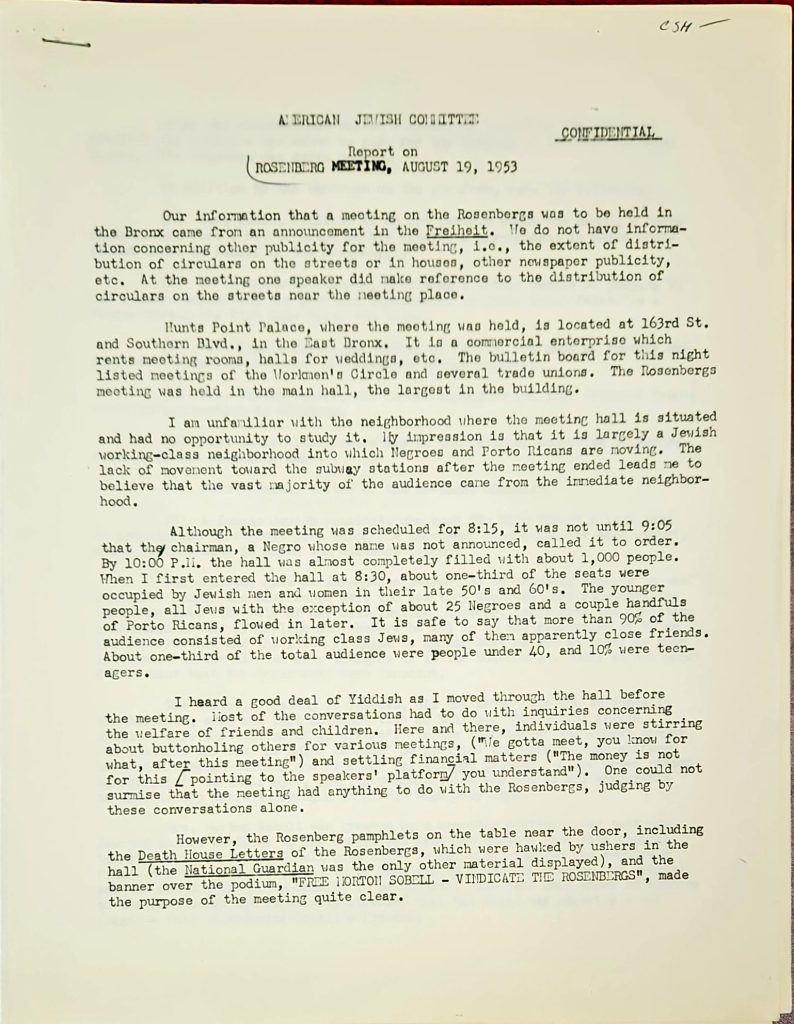
Fineberg testified in front of the House Un-American Activities Committee in August of 1955 [below], reiterating that the Committee to Secure Justice in the Rosenberg case was a Communist enterprise and asserting that “at no time did anti-Semitism play any part in the Rosenberg case.” He assured the House Committee that the Rosenberg supporters “received no funds from any synagogue, Jewish welfare organization, federation of philanthropy or any of the thousands of other Jewish organizations which have the respect of American Jews and their neighbors.”
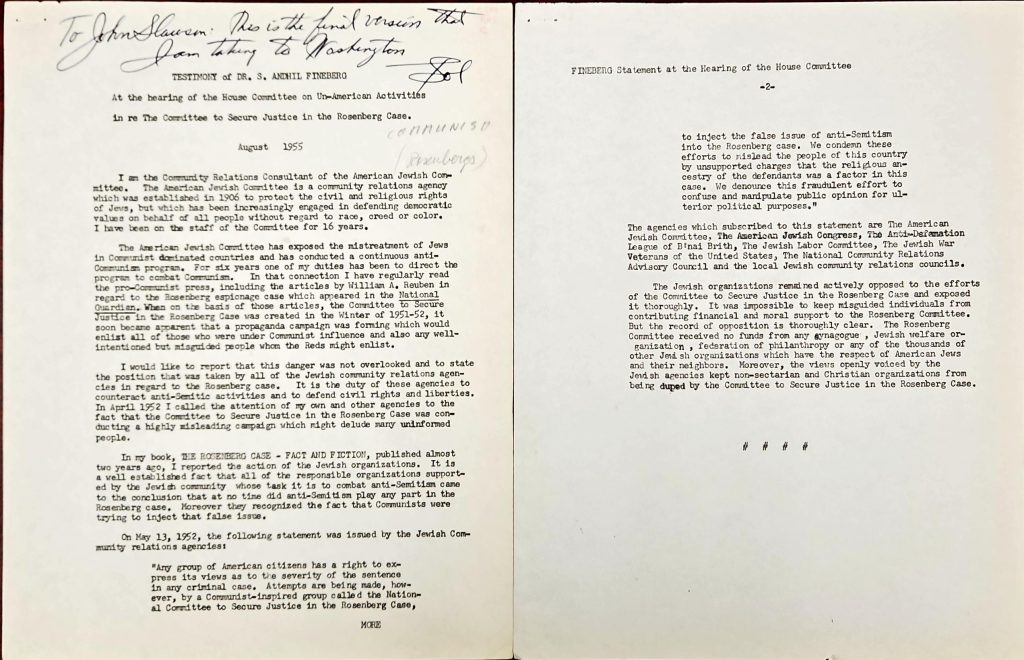
The AJC proudly advertised the fact that the House Un-American Activities Committee used AJC materials in compiling their 157-page expose of “Communist Exploitation of the Rosenberg case,” entitled “Trial by Treason.” [below]
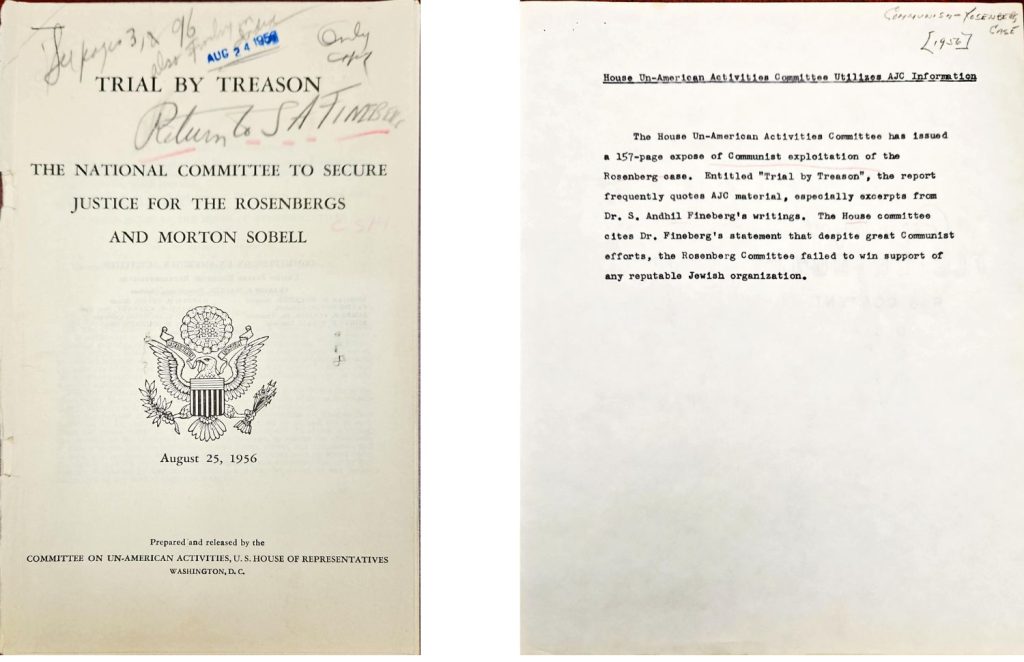
Fineberg went so far as to write a book in 1953, The Rosenberg Case: Fact and Fiction [below], maintaining the guilt of the Rosenbergs and the fairness of the trial. In it, he castigates the coordinated efforts in defense of the Rosenbergs as “the most sensational propaganda campaign ever conducted over the fate of two individuals.” Letters in the AJC files reveal that the U.S. State Department financed the book’s translation and distribution around the world, partly as a counterbalance to the successful publication of The Death House Letters of Ethel and Julius Rosenberg, which was circulating among Rosenberg supporters: “…the State Department has been looking for an adequate presentation of the American side of the case for dissemination among Europeans…the State department’s initial order was for 3,000 copies. They are also planning to have it translated into 18 languages…In addition, the Public Affairs Officers attached to our Embassies abroad will be asked to make key distribution of the book in quarters where they feel it will be most needed.”
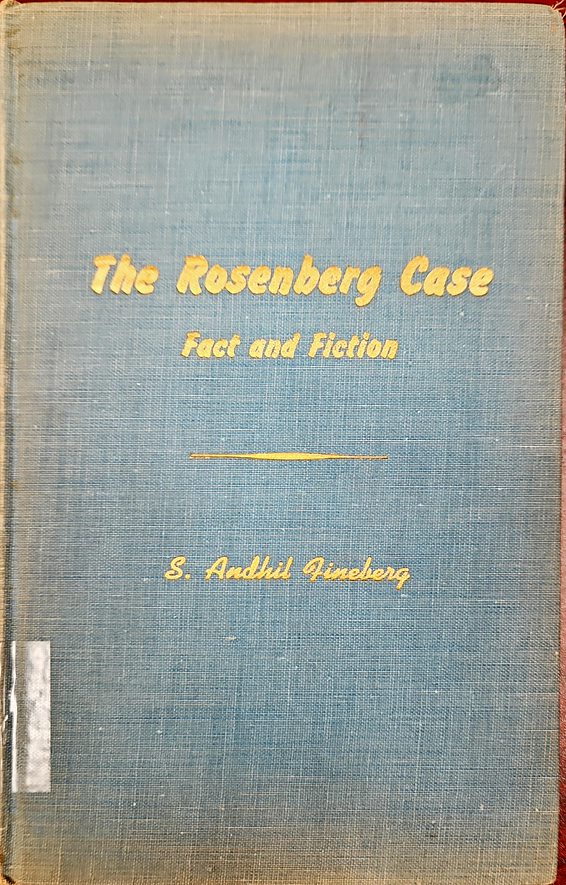
In Francine Prose’s 2021 novel The Vixen, set in the early 1950s in New York City, a young Jewish editor at an august publishing house is tasked with editing a potboiler featuring a treasonous femme fatale named “Esther Rosenstein,” an ill-conceived rightwing effort to bolster popular opinion against the Rosenbergs. One of the principals of the publishing firm is a former spy, working closely with the State Department to circulate this “patriotic” fiction.
Coincidentally, it was while preparing a “show and tell” of archival material for an online Center for Jewish History book discussion about The Vixen, for which we were joined by the author, that this AJC material was uncovered. When she was informed about the existence of The Rosenberg Case: Fact and Fiction, the Fineberg book financed and distributed by the State Department, a surprising analogue to her invented book-within-a-book, author Francine Prose was “blown away,” exclaiming, “It often happens that fiction turns out to have an uncanny relationship to the truth. I’ve seen it happen before, but it’s always startling.”
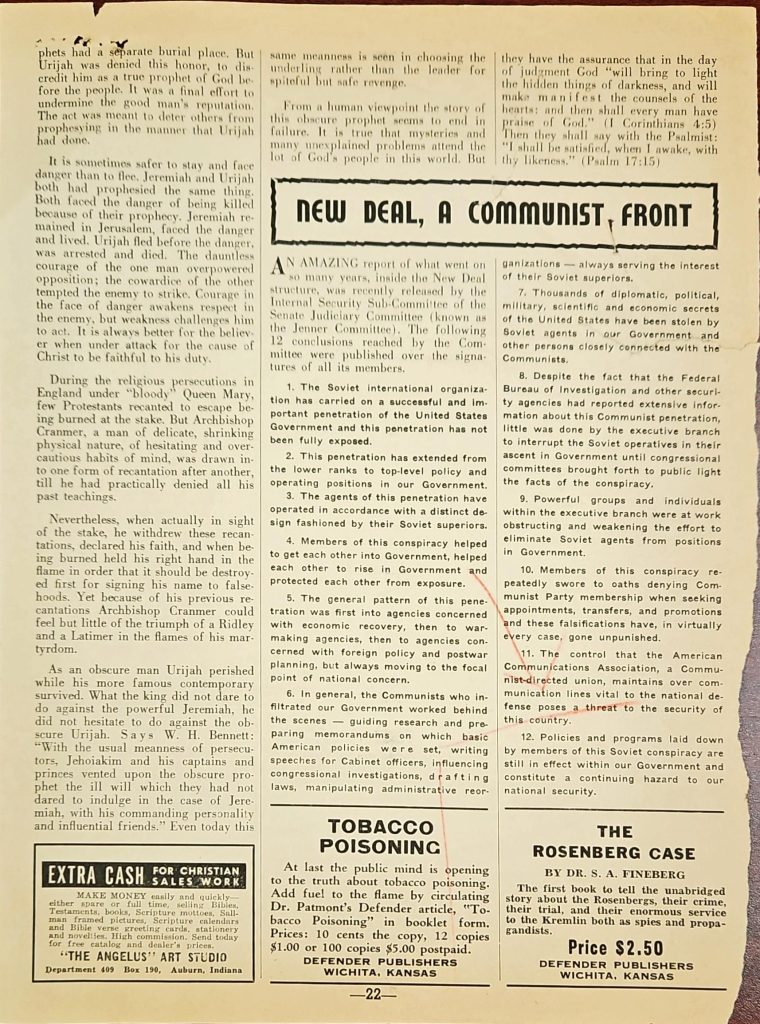
Not surprisingly, a book asserting that justice was served with the execution of the Rosenbergs and that the opposition were all Communists found an enthusiastic audience among right-wing antisemites. The AJC found themselves on the defensive in October of 1954, when an associate sent in a page from The Defender, Gerald Winrod’s antisemitic magazine, which appears to contain an ad for Fineberg’s book [above, lower right]. Somewhat indignantly, Fineberg responded: “Neither the publisher nor I, nor anyone else with whom I am on speaking terms, has ever had any contact with Winrod in regard to the book…I am sure that his people will get nothing out of my book that will make them more anti-Semitic than they already are.” [below]
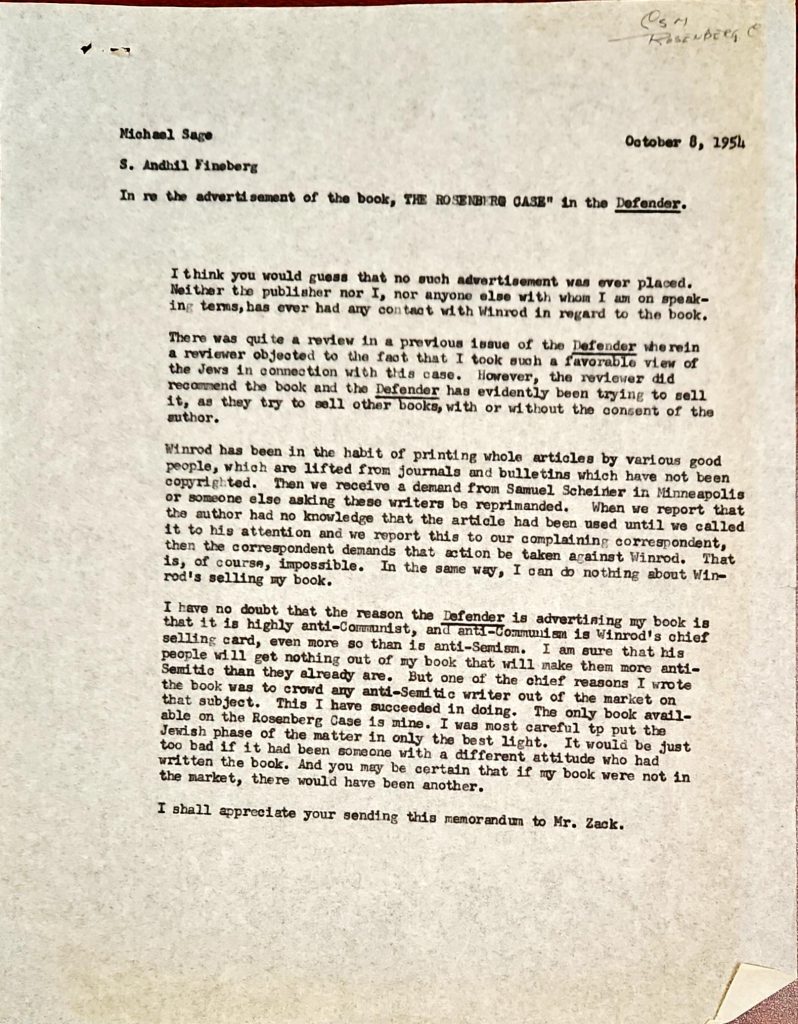
While the AJC was more concerned with dissociating Jews from Communism and anti-American sentiment than defending the Rosenbergs or denouncing antisemitism, they were certainly not alone in this attitude, which reflects the pervasive fear and paranoia of the time. And there was one Rosenberg they did publicly support. No relation to Julius and Ethel, though tainted by association, Anna Rosenberg was falsely accused of Communist ties after her 1950 nomination as Assistant Secretary of Defense and was dismissed as “a little Yiddish woman from Austria-Hungary” on the Senate floor during a contentious confirmation hearing. AJC officials were aghast at the bogus Communist allegations, as well as the suggestion that an immigrant could not faithfully serve her country, and even investigated the possibility of suing one of her accusers. The charges were deemed unfounded by the Committee on Armed Forces, and Rosenberg was subsequently confirmed by the full Senate.
Selections from the materials discussed above are on display on the mezzanine at the Center for Jewish History through July 2023.





Great (and valuable) work, much appreciated.